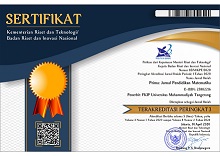MATHEMATICS TEACHERS’ PERCEPTION ABOUT STEM-BASED LEARNING
Abstract
Keywords
Full Text:
PDFReferences
Basham, J. D., Israel, M., & Maynard, K. (2010). An Ecological Model of STEM Education: Operationalizing STEM for All. Journal of Special Education Technology, 25(3), 9–19. https://doi.org/10.1177/016264341002500303
Egarievwe, S. U. (2015). Vertical Education Enhancement – A Model for Enhancing STEM Education and Research. Procedia - Social and Behavioral Sciences, 177(July 2014), 336–344. https://doi.org/10.1016/j.sbspro.2015.02.354
Ejiwale, J. A. (2012). Facilitating Teaching and Learning Across STEM Fields. Journal of STEM Education: Innovations and Research, 13(3), 87–94. http://ojs.jstem.org/index.php?journal=JSTEM&page=article&op=view&path[]=1711
Honey, M. A., Pearson, G., & Schweingruber, H. (2014). STEM integration in K-12 education: status, prospects, and an agenda for research. In STEM Integration in K-12 Education: Status, Prospects, and an Agenda for Research. https://doi.org/10.17226/18612
Jahangir, M. A. (2020). Coronavirus (COVID-19): History, Current Knowledge and Pipeline Medications. International Journal of Pharmaceutics & Pharmacology, 4(1), 1–9. https://doi.org/10.31531/2581-3080.1000140
Kominfo. (2012). Pengguna Internet Indonesia Tertinggi Ketiga di Asia. https://kominfo.go.id/content/detail/2365/pengguna-internet-indonesia-tertinggi- ketiga-di-asia/0/sorotan_media
Kompas. (2020). Arahan Jokowi untuk Pemda: Liburkan Sekolah hingga Tingkatkan Layanan Pasien Covid-19. https://nasional.kompas.com/read/2020/03/15/14452291/ arahan-jokowi-untuk-pemda-liburkan-sekolah-hingga-tingkatkan-layanan-pasien
Lantz, H. B. (2009). Science, Technology, Engineering, and Mathematics (STEM) Education What Form? What Function? Science Education, 1–11.
Mustam, A. A., & Adnan, M. (2019). Perception of Primary Mathematics Teachers on STEM-oriented Teaching and Learning. Journal of Physics: Conference Series, 1227(1). https://doi.org/10.1088/1742-6596/1227/1/012009
Sintema, E. J. (2020). Effect of COVID-19 on the Performance of Grade 12 Students: Implications for STEM Education. Eurasia Journal of Mathematics, Science and Technology Education, 16(7), 1–6. https://doi.org/10.29333/ejmste/7893
Suwarma, I. R., Astuti, P., & Endah, E. N. (2015). “Balloon Powered Car” Sebagai Media Pembelajaran Ipa Berbasis Stem (Science, Technology, Engineering, and Mathematics). Prosiding Simposium Nasional Inovasi Dan Pembelajaran Sains 2015, 2015(Snips), 373–376. https://doi.org/10.1143/JJAP.49.080215
WHO. (2020). Coronavirus disease COVID-2019. Safety and Risk of Pharmacotherapy, 8(1), 3–8. https://doi.org/10.30895/2312-7821-2020-8-1-3-8
DOI: http://dx.doi.org/10.31000/prima.v5i1.2678
Article Metrics
Abstract - 1634 PDF - 1233Refbacks
- There are currently no refbacks.
Prima: Jurnal Pendidikan Matematika
Program Studi Pendidikan Matematika
Fakultas Keguruan dan Ilmu Pendidikan
Universitas Muhammadiyah Tangerang
Jl. Perintis Kemerdekaan I/33, Cikokol
Kota Tangerang, Indonesia
e-mail: primajpm@gmail.com
Prima: Jurnal Pendidikan Matematika (p-ISSN: 2579-9827 | e-ISSN: 2580-2216) is licensed under a Creative Commons Attribution 4.0 International License.







